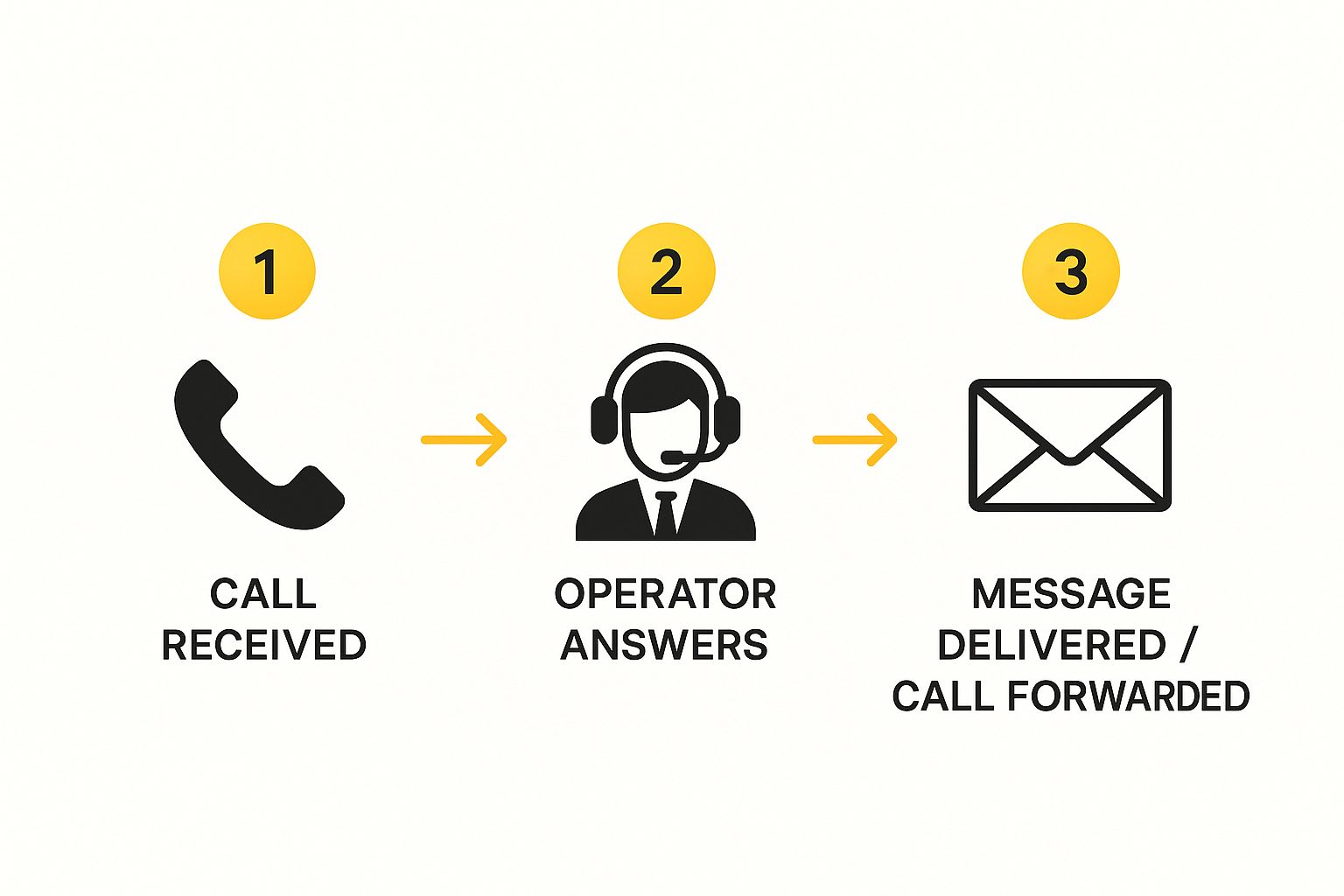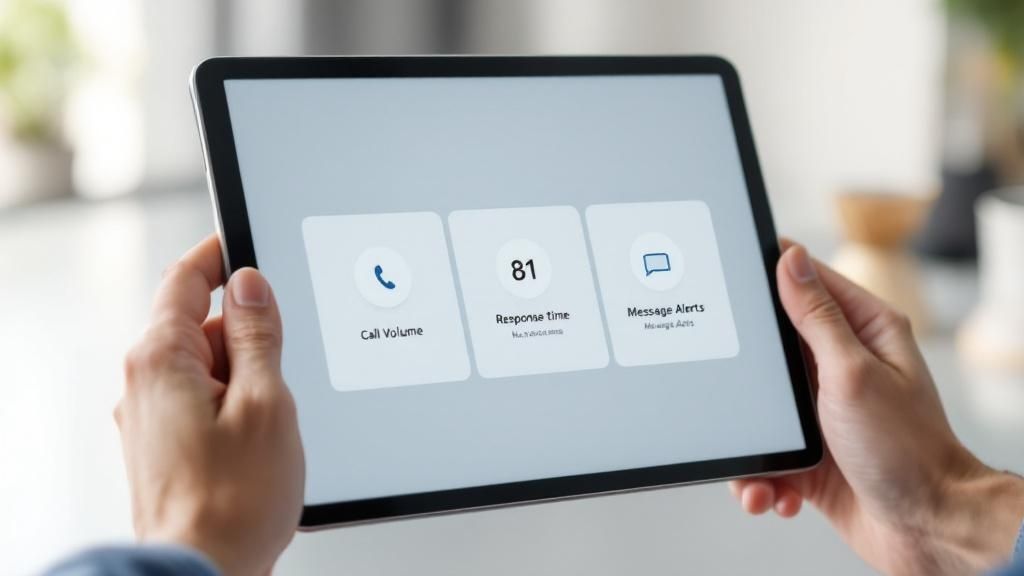Think of an answering service as your business’s communications co-pilot. They’re a dedicated team of live receptionists ready to answer your business calls whenever you can’t. They act as a seamless extension of your company, giving you a professional voice to capture every single opportunity, even after hours.
What Is an Answering Service in Simple Terms?

Let’s be honest, when you’re on a job, deep in a meeting, or just trying to switch off for the day, the phone doesn’t stop ringing. That’s where this "co-pilot" steps in. They don’t just take a name and number; they follow your specific instructions to manage your calls just like an in-house team member would.
This is a world away from a standard voicemail system. A voicemail is just a passive recorder, leaving you with a mountain of messages to sift through later. An answering service, on the other hand, actively engages with your callers in real-time, right when they reach out.
Answering Service vs Voicemail At a Glance
So, what's the real difference between having a live person answer your calls versus just letting it go to voicemail? Let's break it down.
| Feature | Answering Service | Voicemail |
|---|---|---|
| Response Time | Instant, real-time engagement | Delayed; caller leaves a message |
| Caller Experience | Personal and professional interaction | Impersonal and passive |
| Lead Capture | Actively qualifies leads and can book appointments | Passively collects info; high risk of hang-ups |
| Urgent Calls | Can identify and escalate critical issues | All messages are treated the same |
| After-Hours Support | 24/7 availability for continuous service | Collects messages for you to check later |
| First Impression | Creates a professional, trustworthy brand image | Can feel like you're unavailable or too busy |
As you can see, an answering service offers a much more dynamic and professional way to handle your calls, turning every ring into a potential opportunity.
More Than Just a Message Taker
A top-notch answering service does far more than just jot down messages. They become a genuine front-line representative for your brand, handling a whole range of tasks to support your day-to-day operations.
Here’s what they can typically do for you:
- Take Detailed Messages: Capturing all the crucial info so you have the full picture without playing phone tag.
- Schedule Appointments: Booking meetings or jobs directly into your calendar, saving you the back-and-forth.
- Answer Basic Questions: Handling standard queries like your business hours, location, or services.
- Qualify Leads: Using your script to ask the right questions and figure out if a caller is a hot prospect.
This active support means you never have to worry about missing a vital call or a potential new client just because you were tied up. Here in Australia, the call centre industry that provides these services is massive, with over 102,000 people employed in these roles nationwide. The biggest workforces are in New South Wales (over 30,000), Victoria (nearly 29,000), and Queensland (over 20,000), which really shows the scale and importance of this kind of support. You can learn more about the Australian contact centre workforce on acxpa.com.au.
By handling calls professionally, an answering service transforms a potential missed opportunity into a positive customer interaction, building trust from the very first contact.
How a Modern Answering Service Actually Works
So, how does a caller's ring magically find its way to a professional agent when you’re tied up? It’s a slick, behind-the-scenes process that's completely invisible to your customer. The whole setup is designed to be a well-oiled machine, making every caller feel like they’ve reached your front desk directly.
It all starts with call forwarding. You get to set simple rules for your business number. For instance, you could decide to send all calls straight to the service, or maybe just the ones that ring more than three times. Another option is to forward calls only when your main line is already busy. This flexibility ensures no call ever falls through the cracks.
The Agent Interaction
Once a call gets diverted, a highly trained agent picks it up instantly. But they aren't just answering blind; your company’s profile and the custom script you’ve set up pop right onto their screen.
This lets them:
- Greet callers with your business name and specific branding.
- Answer frequently asked questions using the info you've provided.
- Take down the essential details, like the caller's name, contact number, and why they're calling.
This infographic breaks down the simple three-step flow of how it all works.

As you can see, the service acts as a seamless bridge. It makes sure every inbound call is handled professionally, and the details are passed on to you without any delay.
Instant Delivery and Integration
The last piece of the puzzle is getting the message to you. The moment the call wraps up, the agent’s notes are instantly sent your way via your preferred channel—be it SMS, email, or a dedicated app. If a call is urgent, it can be patched through to your personal number on the spot, based on the rules you’ve put in place.
By following this structured process, an answering service guarantees that you receive critical information in real-time, allowing you to follow up on hot leads or address urgent customer needs promptly.
This entire workflow is built for efficiency, but you can crank it up a notch with the right tech. To get a better handle on how technology can streamline these interactions, it's worth exploring guides on effective call management software that brings all your communications into one place.
Key Benefits for Growing Australian Businesses

For a growing Aussie business, an answering service isn't just some nice-to-have extra—it's a serious bit of kit for unlocking growth. It tackles the everyday headaches that slow you down, from missed leads to an overworked team. By taking care of your calls, it lets you get back to doing what you do best.
Picture a solo tradie on a noisy construction site. Every single missed call could be a big-ticket job gone for good. With an answering service, that call gets answered, the details are jotted down, and the lead is locked in, all while they stay safely focused on the job.
Capture Every Lead and Opportunity
Let's face it, the modern marketplace doesn't clock off at 5 pm. Your potential customers could be scrolling your website late at night or shooting off an enquiry from a totally different time zone. An answering service gives you that 24/7 presence, making sure no lead ever falls through the cracks.
This constant availability does more than just bag you more leads; it builds a rock-solid reputation for being reliable. When customers know they can always get through to a real person, they see your business as professional and dependable. That's a massive leg-up on competitors who let calls ring out or dump them into a voicemail black hole.
For a lot of Australian businesses, being available 24/7 with immediate responses isn't a bonus anymore—it's what customers expect. An answering service nails this demand, turning every single call into a positive experience for your brand.
This focus on the customer experience is absolutely crucial. In Australia, customer satisfaction and operational efficiency are massive, and businesses are turning to automation and AI to keep up with demands for instant, personalised support. You can dive deeper into the evolution of Australian call centres on acxpa.com.au.
Boost Team Productivity and Focus
Imagine your team finally free from the constant interruption of a ringing phone. When an outside service is managing your calls, your staff can knuckle down and concentrate on the high-value tasks that actually bring in the money and grow the business. It’s a simple shift that has a huge impact on productivity.
Think about a small law firm. They could use a service to handle confidential client intake after hours. This frees up their paralegals to focus squarely on case prep during the day. By delegating like this, you empower your team to do their best work, which is great for morale and even better for your bottom line. Your whole operation just runs smoother, looks more professional, and becomes more profitable.
Exploring Different Types of Answering Services
Let's be clear: not all answering services are created equal. Figuring out which one is right for you is all about matching the service to your business goals. The best choice really boils down to your specific needs, how many calls you get, and the kind of experience you want your customers to have.
The one most people think of first is the traditional live operator service. This is your 24/7, human-powered command centre, staffed with real people ready to answer calls, jot down messages, and patch through the urgent stuff. It’s the go-to when a human touch is absolutely essential, like for a medical practice needing an empathetic voice after hours or a tradie trying to catch every emergency call-out.
Automated and Specialised Services
Now, if you're drowning in a high volume of simple, repetitive questions, an automated answering service can be a real lifesaver—and a cost-effective one at that. These systems use an Interactive Voice Response (IVR) menu. You know the drill: "press one for sales, press two for support." It’s a straightforward way to guide callers to the right place or give them basic info without needing a live person.
Digging a bit deeper, you’ll also find specialised answering services. These are built for specific industries that have their own language and rules. For instance:
- Medical Services: Agents are trained up on patient privacy (like HIPAA) and know how to handle sensitive health information with care.
- Legal Services: Receptionists can handle confidential client intake and actually understand the legal lingo being thrown around.
- Property Management: Operators are pros at managing tenant maintenance requests and enquiries using industry-specific scripts.
The real magic is happening in the middle with hybrid models. These services mix the get-it-done efficiency of automation for routine tasks, like booking an appointment, with the smarts of a live agent for when a customer has a more complex problem.
Comparison of Answering Service Types
To help you get a clearer picture, let's break down the main differences. Understanding the pros and cons of each type will make it much easier to find the perfect fit for your business.
| Service Type | Best For | Pros | Cons |
|---|---|---|---|
| Traditional Live Operator | Businesses needing a personal, human touch 24/7, like medical or legal practices. | • High-quality customer experience • Can handle complex queries • Builds trust and rapport |
• Higher cost • Potential for human error • Scalability can be limited |
| Automated (IVR) | High-volume businesses with simple, repetitive enquiries. | • Very cost-effective • Handles large call volumes easily • Available 24/7 |
• Can feel impersonal • Frustrating for complex issues • Limited problem-solving ability |
| Specialised | Industries with specific compliance or terminology needs, like healthcare or real estate. | • Industry-specific expertise • Ensures compliance • Higher quality of interaction |
• Can be more expensive • May have limited scope outside of its speciality |
| Hybrid (Live + Auto) | Businesses wanting the best of both worlds: efficiency for simple tasks and human help for complex ones. | • Cost-efficient and scalable • Excellent customer flexibility • Reduces agent workload |
• Requires careful setup • Can be complex to manage the handover |
Ultimately, the right service is the one that solves your biggest communication headaches without creating new ones.
Finding the Right Fit for Your Operations
So, how do you choose? It’s all about matching the service’s strong suits to your day-to-day reality. A small e-commerce shop might do brilliantly with a hybrid model, using automation for quick order status checks but escalating complaints to a real person. On the other hand, a bustling real estate agency might need a fully live service around the clock to book viewings and qualify buyers on the spot.
By taking a hard look at what you really need—whether it’s capturing leads, routing calls, or providing expert support—you can pick a service that feels less like a vendor and more like a genuine partner in your growth.
What Kinds of Businesses Really Click with Answering Services?

Let’s be honest, an answering service isn't a one-size-fits-all magic wand. But for certain industries, it’s the secret sauce. Its value really shines in businesses where every single incoming call could be a game-changing opportunity.
Think about it – from local medical clinics to tradies out on a job, countless Aussie businesses rely on these services to keep a professional front line and make sure no lead ever slips through the cracks.
Take a busy real estate agency, for example. Agents are always on the move, zipping between property viewings, appraisals, and client meetings. A missed call isn't just a missed call; it could be a seller ready to list their million-dollar home or a keen buyer desperate to book an inspection. With a service in place, every enquiry is handled with polish, 24/7, with appointments slotted straight into their calendars.
That kind of instant, professional response is a massive competitive advantage. You can dig deeper into how a specialised real estate answering service gives agents a serious leg up.
How It Looks in the Real World
The applications go way beyond just property. Let's look at a few other sectors where an answering service can be a total game-changer:
- E-commerce Stores: Picture the chaos of Black Friday or the Christmas rush. An answering service can field the flood of customer queries about orders, leaving your core team free to focus on what they do best: packing orders and running killer marketing campaigns.
- Healthcare Practices: A medical clinic can use a secure, HIPAA-compliant service to manage confidential patient bookings and handle urgent after-hours calls. It’s peace of mind for both the staff and the patients who rely on them.
- Trades and Services: Plumbers, sparkies, and other tradies are almost never in the office. They're on-site, up a ladder, or under a sink. A service ensures those emergency call-outs are captured immediately and non-urgent jobs get booked in, stopping revenue from walking out the door.
The common thread here is simple: if your business loses money or opportunity when a call goes unanswered, an answering service isn't just a 'nice-to-have'—it's an essential tool for growth and happy customers.
These real-world examples show just how flexible these services are, solving unique challenges across different fields. It’s the kind of social proof you need to see exactly how it could fit into your own business.
How to Choose the Right Answering Service Provider
Picking the right partner to handle your calls is a massive decision for your business. Let's be honest, a great answering service feels like a natural extension of your team. But a bad one? That can do some real damage to your reputation. To make a smart choice, you've got to look past the slick sales pitch and dig into the details that actually matter.
First up, let's talk money. Pricing models are all over the shop—some charge per-call, others per-minute, and some offer a simple flat-rate monthly plan. If your calls are often long and detailed, a per-minute model might make sense. But if you have a pretty steady stream of calls, a flat-rate plan gives you that predictable monthly cost. Have a good look at your call history to figure out which structure will give you the best bang for your buck without skimping on quality.
Evaluating Key Features and Capabilities
Okay, so pricing is sorted. Now for the really important stuff: what can they actually do? The tech and operational side of things is where a service really proves its worth. A huge one is whether they can integrate with the software you already use day-in, day-out, like your CRM or scheduling tools. When it's seamless, new leads get logged and appointments get booked automatically—no more mind-numbing data entry for you or your team.
You’ll also want to suss out their operational standards. Don't be shy about asking the hard questions:
- Agent Training: What's their training process like? Do they offer specialised training for certain industries?
- Industry Specialisation: Have they actually worked with businesses in your sector before, like medical or property management?
- Data Security: How are they going to protect your business and customer info? Seriously, ask for the details.
A provider that can offer specialised knowledge and rock-solid security isn’t just a message-taking service—they're a genuine business partner. That's the difference right there.
Finally, think about where they're actually based. The Australian call centre industry is on track to hit $2.0 billion in revenue by 2025, but a lot of companies still send their operations offshore to save a few dollars. An Aussie-based team just gets it—they have the local context and cultural understanding that makes your callers feel heard and comfortable. You can get more insight into the Australian call centre industry trends on ibisworld.com.
By weighing up all these factors, you can find a quality business answering service that will genuinely help your business grow.
Frequently Asked Questions About Answering Services
Thinking about an answering service for your business always brings up a few key questions. It's smart to get these sorted before you dive in, so let's walk through the most common things people ask.
First up, the big one everyone wants to know about: the price.
How Much Does an Answering Service Typically Cost?
The cost really depends on how you want to be billed. Some services charge per-minute, which can be around $1.50-$2.50 AUD, while others might charge per call or offer a flat monthly fee for a certain number of minutes.
A basic plan might set you back $100-$200 a month. If you’ve got a lot of calls coming in, you’ll be looking at a more comprehensive (and more expensive) plan. Always ask if there are any sneaky setup fees or extra charges for things like booking appointments for you.
Once the cost is clear, the next worry is usually about a new service messing up your current setup.
Can an Answering Service Integrate with My Existing Software?
Absolutely. Most modern answering services are built to play nice with the tools you're already using. We're talking about CRMs like Salesforce, scheduling apps like Calendly, and even your helpdesk software.
This is a game-changer because it means data just flows where it needs to go. A new lead can be created in your CRM automatically, or an appointment can pop straight into your calendar without you lifting a finger. Just make sure to double-check they support your specific software before you sign on the dotted line.
Finally, there's the concern about how it all looks to your customers. You don't want them to feel like they're talking to a random call centre.
A good answering service should feel like a natural part of your team. The goal is for your customers to think they're speaking directly with someone from your office.
This is where the magic happens. Professional agents use your scripts, greet callers with your company name, and follow your exact instructions. It keeps your brand looking sharp and ensures a great experience every single time your phone rings.
Ready to stop missing calls and start capturing every opportunity? OnSilent offers a smarter way to manage your communications without the high cost of a traditional answering service. See how our smart voicemail can save you hours each week.

